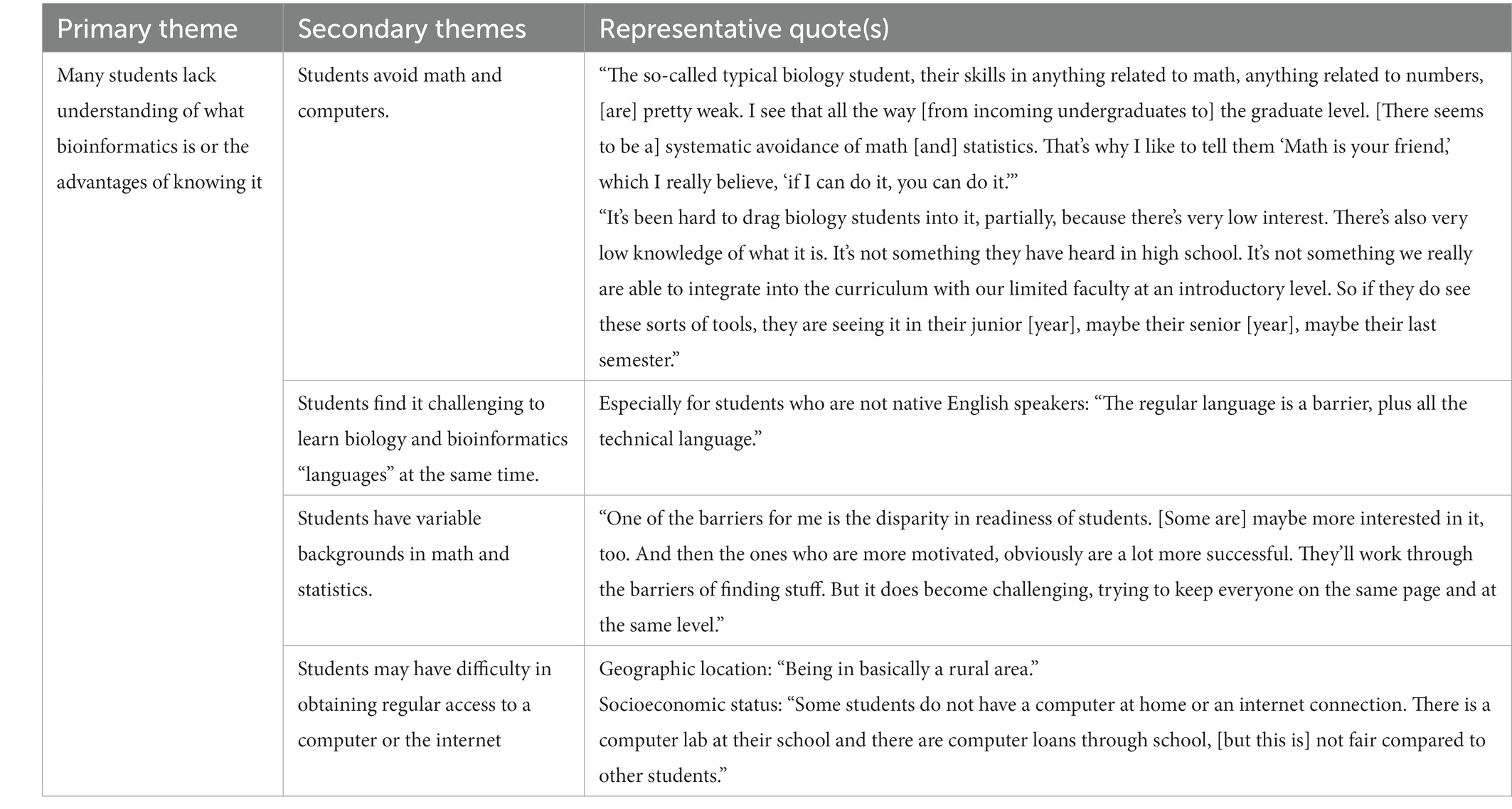The 20-Second Trick For Bioinformatics Tutor
The 20-Second Trick For Bioinformatics Tutor
Blog Article
Not known Facts About Bioinformatics Tutor
Table of ContentsBioinformatics Tutor - The FactsGet This Report about Bioinformatics TutorA Biased View of Bioinformatics TutorA Biased View of Bioinformatics TutorThe Ultimate Guide To Bioinformatics Tutor
Of the total participants associated with the training, 80% were students from public college institutions, while the staying 20% came from private organizations. To get a certification of involvement, students were needed to attend at least 90% of the complete training hours. As an outcome of this need, a remarkable 95% of the individuals efficiently obtained their certifications, having not just fulfilled the minimum presence criteria but additionally finished all appointed activities throughout the training.
During the elevation of the COVID-19 pandemic, particularly in between June and August 2020, the project team was charged with organizing specialized training in bioinformatics. This training was especially targeted at pupils from the research study group Core for Study in Applied Computer at the Federal University of Pará (UFRA) The adjustment to remote understanding systems as a result of the pandemic produced a possibility to check out new teaching approaches and electronic tools that enhanced both reach and effectiveness.
This training course was designed to provide an easily accessible yet thorough introduction of Artificial Knowledge techniques, especially as applied in bioinformatics (Bioinformatics Tutor). This digital format allowed involvement from trainees throughout Brazil, many of whom might not have had the chance to participate in in-person sessions.
Everything about Bioinformatics Tutor
Roughly 50% of the overall training hours were committed to practical tasks where students constructed intelligent designs and applications in a range of clinical domain names, including genes, molecular biology, and environmental information evaluation. These platforms enabled pupils to involve in real-time information manipulation, design training, and algorithm testing.
The course brought in 80 participants in total amount. Sixty of them were associated with different greater education and learning establishments in the state of Pará, while the remaining twenty originated from institutions located in 5 other Brazilian states. This broad geographical representation highlighted the nationwide interest in bioinformatics and the expanding demand for specialized skills around. By presenting Expert system in a relevant and useful context, the initiative served to bridge the void in between concept and real-world application, supplying trainees with a solid foundation for future research or work in the area.
The training effort developed part of a more comprehensive scholastic outreach effort called the Bioinformatics on the Road job. This task has, throughout the years, presented lots of pupils to the world of bioinformatics and computational biology. The events held under this umbrella initiative have occurred throughout numerous areas and years, as summed up in Table 1 (List of events, locations, years, and complete numbers of students and teachers)
Several Continued of these groups, originally brought together by their participation in training events, have actually given that gone on to generate independent clinical research study in collaboration with regional academic organizations. The training not just promoted scientific thinking within the context of bioinformatics yet likewise sparked joint connections that prolonged past the training atmosphere.
Bioinformatics Tutor - The Facts
The exact same group, excluding IH and RR, also acted as tutors for the sensible training modules. Financing for the project was provided via the grant 88887.200562/ 2018-00 from CAPES.
The Federal College of Pará's Office of Research (PROPESP/UFPA) additionally gave monetary support, especially for the manufacturing of the last manuscript. The authors state no financial or commercial disputes of interest that can have affected the research. Moreover, all interpretations and viewpoints shared in this article are exclusively those of the authors and do not necessarily mirror site link those of their respective organizations, the author, editors, or reviewers associated with the magazine process.

The Facts About Bioinformatics Tutor Revealed
From an instructional perspective, the mentor technique utilized in the training was intentionally interactive. Classes were performed in a manner that encouraged pupil engagement and discussion, surpassing memorizing memorization to check out exactly how ideas are created, used in life, and tested in academic setups. The training viewpoint focused on supporting both strong and struggling trainees, giving individualized assistance, and building confidence via sustained mentorship and patience.

Each group, containing around 36 participants, was supported by three coaches-- the majority of whom were postdoctoral scientists with customized knowledge. These mentors not only aided create the group tasks however additionally promoted their execution, guaranteeing that each research concern was both appropriately difficult and relevant. The objective was to give a biologically reasonable context that individuals might discover with flexible goals and access to curated datasets.
For added insights right into the methodology and end results of this project-based understanding technique, readers are guided to S1 Text, which includes in-depth summaries of the instructional framework, examination strategies, and task styles made use of in the training sessions.
Excitement About Bioinformatics Tutor
Of the total participants involved in the training, 80% were pupils from public higher education establishments, while the remaining 20% came from her explanation private institutions. To qualify for a certificate of involvement, trainees were called for to participate in at the very least 90% of the total training hours. Significantly, beyond the trainees who signed up in the training sessions, 7 experienced trainers took part in providing the programs, while 3 specialized study professors coordinated the overall training process. Approximately 50% of the total training hours were dedicated to useful activities where students built intelligent versions and applications in an array of scientific domains, including genetics, molecular biology, and ecological information analysis. The training not just fostered scientific thinking within the context of bioinformatics yet additionally stimulated joint connections that extended past the training setting.
Report this page